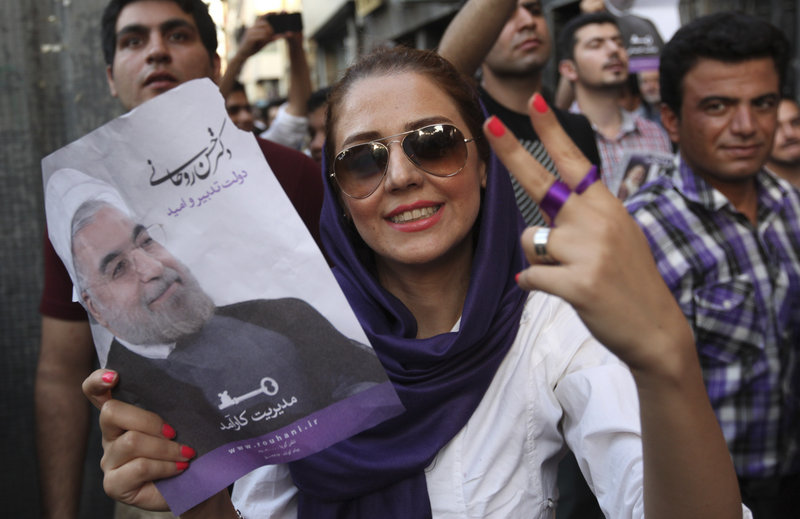TEHRAN, Iran – Wild celebrations broke out on Tehran streets that were battlefields four years ago as reformist-backed Hasan Rowhani capped a stunning surge to claim Iran’s presidency on Saturday, throwing open the political order after relentless crackdowns by hard-liners to consolidate and safeguard their grip on power.
“Long live Rowhani,” tens of thousands of jubilant supporters chanted as security officials made no attempt to rein in crowds — joyous and even a bit bewildered by the scope of his victory with more than three times the votes of his nearest rival.
In his first statement after the results were announced, Rowhani said that “a new opportunity has been created … for those who truly respect democracy, interaction and free dialogue.”
But in Iran, even landslides at the ballot box do not equate to policymaking influence.
All key decisions — including nuclear efforts, defense and foreign affairs — remain solidly in the hands of the ruling clerics and their powerful protectors, the Revolutionary Guard.
What Rowhani’s victory does is reopen space for moderate and liberal voices that have been largely muzzled in reprisal for massive protests and clashes in 2009 over claims the vote was rigged to deny reformists the presidency.
Rowhani’s supporters also viewed the election as a rebuke of uncompromising policies that have left the Islamic Republic increasingly isolated and under biting sanctions from the West over Tehran’s nuclear program.
The 64-year-old Rowhani is hardly a radical — having served in governments and in the highly sensitive role of nuclear negotiator — but he has taken a strong stance against the combative international policies of outgoing President Mahmoud Ahmadinejad and others.
“I’ve never been an extremist,” Rowhani said on state TV shortly after the official results were announced. “I support moderation.”
“I thank God that once again rationality and moderation has shined on Iran,” he continued. “This is the victory of wisdom, a victory of moderation and a victory of commitment over extremism.”
His emphasis on outreach could sharply lower the political temperature between Iran and the West — including Israel — and perhaps nudge the ruling establishment toward more flexible approaches in possible renewed nuclear talks with the U.S. and world powers.
Rowhani also has added leverage with his political godfather and ally, former President Akbar Hashemi Rafsanjani, who was blocked from the ballot but now can exert significant influence from the wings.
“They counted my vote, they counted my vote,” some supporters sang in reference to the protest slogan of four years ago: “Where is my vote?”
“It’s the spring of freedom, too bad Neda isn’t here,” some yelled in memory of Neda Agha Soltan, a young woman fatally shot during the 2009 unrest and whose dying moments — posted on the Web — became an enduring symbol of the bloodshed.
Interior Minister Mostafa Mohammad Najjar said the turnout was 72.7 percent, suggesting that liberals and others abandoned a planned boycott as the election was transformed into a showdown across the Islamic Republic’s political divide. Iran has 50 million voters.
Israel has led accusations that Iran could secretly be trying to develop an atomic weapon, and has warned a military option is possible if negotiations with world powers go nowhere. Israel also strongly condemns Tehran for its backing of anti-Israel Islamic militant groups such as Hezbollah and Hamas in the Gaza Strip.
Iranian officials, including Rowhani, insist the country’s nuclear efforts are only for energy and medical purposes.
Send questions/comments to the editors.



Success. Please wait for the page to reload. If the page does not reload within 5 seconds, please refresh the page.
Enter your email and password to access comments.
Hi, to comment on stories you must . This profile is in addition to your subscription and website login.
Already have a commenting profile? .
Invalid username/password.
Please check your email to confirm and complete your registration.
Only subscribers are eligible to post comments. Please subscribe or login first for digital access. Here’s why.
Use the form below to reset your password. When you've submitted your account email, we will send an email with a reset code.